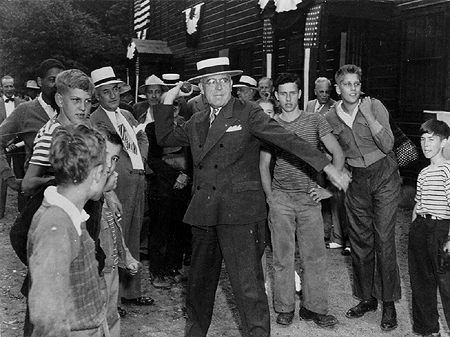

David Leo Lawrence, Mayor of the City of Pittsburgh, 1946-1958; Governor of the Commonwealth of Pennsylvania, 1959-1963. BORN: 18 June 1889.(1) DIED: 21 November 1966.(2) BURIED: Calvary Cemetery.(3)
From The Pittsburgh Point, 1 December 1966.
After 17 days of waiting in hopeless suspense for the
inevitable death,
Pittsburgh paid its final respects last week to former Gov. David L.
Lawrence.
There were appropriate rites, climaxed by a requiem mass sung Friday at
St. Mary's Church at the Point, where Lawrence had been baptized as a
child. There were ample obituaries and editorial tributes in the
newspapers. And, following the obituaries, there was a start of open
speculation about which aspiring Democrat will succeed to the Lawrence
power. The city was already adjusting to the sudden departure of its
long-time chief.
The official farewell was the low pontifical mass celebrated by Bishop
John J. Wright before a congregation of Pittsburgh's political and civic
leaders. But for many the real farewell came at McCabe's funeral home in
Shadyside, where Lawrence's body lay for three days prior to the funeral.
There, those who knew and loved him looked on his face for the last time.
The Last View.
Lawrence's body had been placed on a bier at one end of a large reception
room. He was wearing a dark suit and necktie. The familiar rimless
spectacles were in place. The hands were crossed and entwined with rosary
beads. The body had been turned slightly to face the mourners who came to
stand, sometimes to kneel and pray, occasionally to weep.
Having paid their respects to the former governor, the mourners then
mingled in the throng which on occasion filled the reception room, the
adjoining hallway, and overflowed onto the sidewalk outside. Mrs. Alyce
Lawrence, the governor's widow, and other members of the family received
friends in a smaller room just off the reception room. Several other
rooms were given over to scores of bouquets which lined the walls, the
cards of their senders prominently displayed.
The large crowd was subdued, but it was not solemn. There was
handshaking, quiet laughter and conversation, and as might be expected,
most of the talk was about politics. There were reminiscences about the
past and Lawrence's pre-eminent place in it, and there was speculation
about the future of the Democratic Party now that its chief was dead.
The reception, in its informality and its spontaneous mingling of sadness
and gaiety, seemed like a private affair, which allowed each mourner to
pay his respects in his own way, unembarrassed and face-to-face with the
deceased.
The requiem mass, by contrast, was a state affair as well as a religious
one. Seated in the front rows were Governor Scranton, Governor-elect
Shafer, representatives of President Johnson, and visiting mayors from
other cities. Vice-president Humphrey had planned to come, but was called
instead to a cabinet meeting with the president in Texas. Senator Robert
Kennedy, of New York, came unexpectedly and was seated in the front row
of mourners, the closest one to the flag-draped coffin. The general public
was admitted to seats in the balcony, above and behind the television
lights and cameras that lined the balcony rail.
Bishop Wright, reading the mass, noted that the church does not encourage
eulogies, recognizing as it does "the futility of praising the blessed
dead when they are before the awesome judgment seat of God."
Judgment and Praise.
"Men like David Lawrence don't ask the church to praise them," Bishop
Wright continued. "They ask the church only to prepare them for the
judgment of God."
Bishop Wright went on to praise Lawrence, however, in simple terms that
dwelt more on the man than on his accomplishments.
"However far his political fortunes brought him, however awesome his
political influence, he never forsook his friends, he never forswore his
baptismal vows," the bishop said.
Drawing on his long friendship with Lawrence, Bishop Wright told of the
first of many times he had gone with Lawrence to visit children of unwed
mothers at the Rosalia foundling home.
"We wandered into the nursery," the bishop said. "There was only one
sister there, nobody he could impress. But the manner in which he
reacted, the attention he gave those children, told me then and forever
that there was a man a good man and a great man."
"There are many great jobs and many great reputations, but there are
fewer great men."